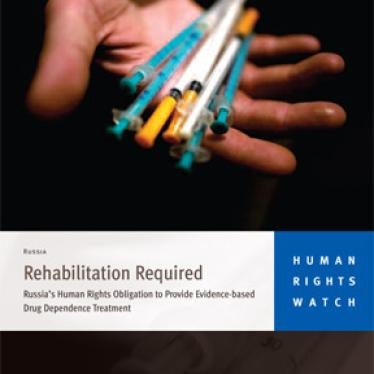Russian health policies are failing to adequately treat drug addiction, compounding the country’s serious illicit drug use and drug dependence problem and further putting drug users at increased risk for other serious diseases, Human Rights Watch said in a report released today. Russia’s healthcare system restricts access to evidence-based drug dependence treatment for injection drug users, in violation of the government’s international obligations.
In the 110-page study, titled "Rehabilitation Required: Russia’s Human Rights Obligation to Provide Evidence-based Drug Dependence Treatment," Human Rights Watch found that the treatment offered at state drug treatment clinics in Russia was so poor as to constitute a violation of the right to health. The report concluded that drug dependent people in Russia who want to overcome their dependence are left virtually to their own devices in their battle with this serious and chronic disease.
"The lack of effective drug addiction treatment in Russia means that drug users who want to break their addiction cannot, and are condemned to a life of continued drug use," said Diederik Lohman, senior researcher in Human Rights Watch’s HIV/AIDS and Human Rights Program. "This leaves them vulnerable to HIV infection, other drug-related health conditions, and death by overdose."
Russia faces a serious illicit drug use and drug dependence problem. Several million people in Russia are believed to be drug users, and hundreds of thousands of them are dependent on drugs. HIV has spread rapidly among injection drug users in Russia since the early 1990s; more than 10 percent of injection drug users are believed to be living with HIV.
Human Rights Watch’s report analyzes Russia’s dependence drug treatment system from the point of view of international best practices in addiction treatment and the international right to health. The report identifies, among others, the following problems:
• Russian law explicitly prohibits the use of the most effective and best researched drug dependence treatment approach for opiate dependence, methadone or buprenorphine maintenance treatment. Although UN agencies strongly endorse the use of these medications, which are successfully used in treating drug dependent people in dozens of countries, top Russian health and law enforcement officials oppose them.
• While detoxification treatment, which is aimed at safely withdrawing the patient from physical dependence on drugs, is available throughout Russia, rehabilitation treatment, which helps patients prevent relapses by helping them develop control over urges to use drugs, is available at state clinics in only about one-third of Russia’s regions. Research has clearly established that detoxification treatment on its own is not effective treatment. Russian law clearly stipulates that rehabilitation treatment should be available to drug users but the Russian government has failed to adopt a clear plan to set up rehabilitation centers throughout the country.
• Various barriers discourage drug users from seeking drug treatment in Russia. The most important barrier examined in the report is a state policy under which drug-dependent persons who voluntarily seek treatment are put on a drug-user registry. This registry is used to restrict drug users in their rights and is perceived as stigmatizing by most drug users. Research on drug-dependence treatment has found that treatment services should be easily accessible to ensure that the largest possible number of people seeks help.
• Russia has made little effort to incorporate lessons learned into its drug-dependence treatment services. The report examines how Russian treatment practices ignore much of the evidence yielded from decades of international research into drug-dependence treatment. The report found, for example, that Russia has failed to offer appropriate psychosocial counseling during detoxification treatment, even though research has found a direct link between the availability of such counseling and treatment success. Instead, patients in detoxification treatment are heavily sedated, making counseling efforts difficult or even pointless.
Due to these and other problems, the effectiveness of drug-treatment services offered at state clinics in Russia today is so low as to be negligible. Most patients remain in treatment for just a few weeks – despite the fact that research on drug-dependence treatment shows that, for most patients, treatment benefits start only after three months – and more than 90 percent return to using illicit drugs within a year of entering into treatment.
"Russia urgently needs to incorporate international best practices for drug treatment into its treatment system," said Lohman. "Drug users, their families, and Russian society pay a hefty price for the failure to do so."
Research in other countries has shown that evidence-based treatment of drug users leads to considerable savings on drug-use-related law enforcement efforts, incarcerations of drug users, and healthcare costs due to HIV, hepatitis C, and other drug-related health conditions.
Russian policymakers and the public often blame drug users for their failure to overcome their drug dependence. Some are currently advocating laws and policies that would allow the Russian state to force drug users into treatment.
"The vast majority of people who are dependent on drugs in Russia want to overcome their addiction," said Lohman. "The Russian government must develop treatment programs that help them become free of addiction, not simply cast them aside."







